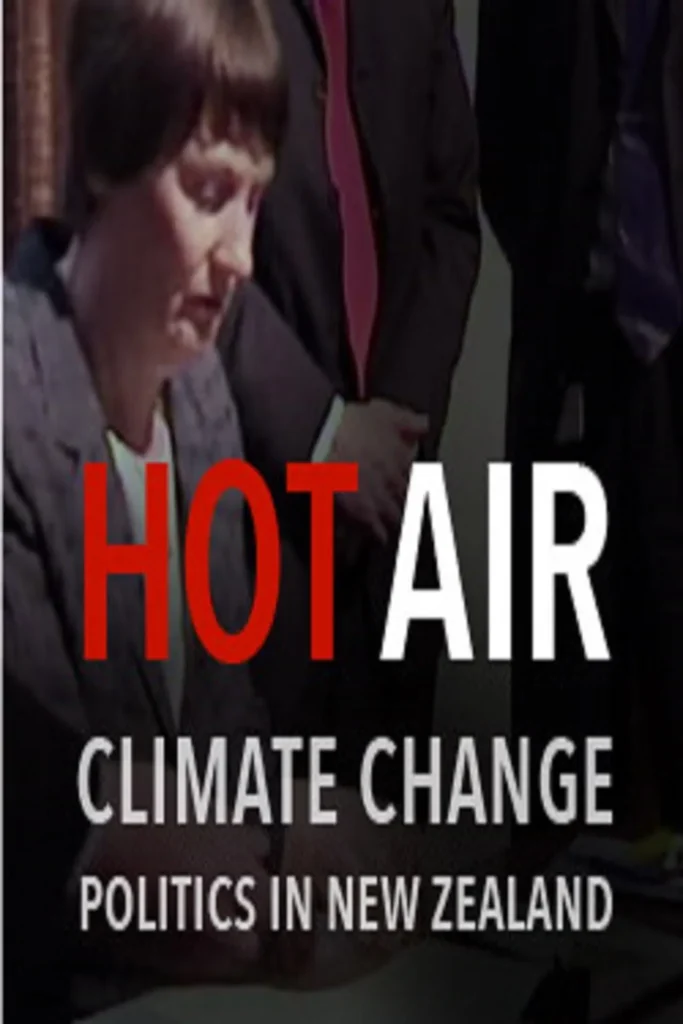
Alister Barry’s Hot Air blazes a trail through New Zealand’s climate-change politics with the intensity of its title. Released in 2014 (co-directed by Abi King-Jones), this fiery documentary pieces together two decades of policy struggles and political theater around greenhouse gas emissions. From early optimism under Labour’s Geoffrey Palmer to the Coalition government’s era of climate skepticism, the film makes a compelling case that “politics, as much as coal, poses the biggest threat to the world’s climate”
Drawing on Barry’s trademark melding of archival news footage and new interviews, Hot Air feels more like a political thriller than a dry science lecture – but its substance is very real.
Origins and Context
Hot Air grew out of director Alister Barry’s long-running obsession with uncovering New Zealand’s political backroom dramas. Barry’s career (spanning from Mururoa 1973 through The Hollow Men) has been defined by provocative, self-funded films that expose how power and policy intersect. In Hot Air he turns his lens to climate change – what he calls “the biggest issue of our time”. As Barry told NZ On Screen, he felt it was “important to explain exactly the lay of the land politically,” even if the story it reveals is depressing. In other words, the film exists not just to chronicle history but to inform citizens how that history was made.
The documentary’s historical backdrop begins in 1990, when the New Zealand government set modest emissions targets – a period when many policymakers (like Labour’s Geoffrey Palmer) were confident a solution lay ahead. Barry’s synopsis puts it plainly: “In the years since New Zealand politicians began to grapple with climate change our greenhouse gas emissions have burgeoned”. Indeed, Hot Air shows that despite early proposals (e.g. Simon Upton’s carbon tax under the Bolger government), no sustained policy was enacted, and emissions kept rising. The directors even draw a line from those early debates to 2003’s infamous “fart tax” proposal – when farmers, fearing an agricultural emissions levy, drove tractors into Wellington and up Parliament’s steps. These historic scenes make the past feel immediate, reminding viewers that climate policy in NZ has long been political football
Plot and Themes
Hot Air is organized chronologically, stitching together news clips and interviews so that the political showdown feels alive. It intercuts three former Environment Ministers (Simon Upton, David Parker, and Pete Hodgson) as they candidly recount their efforts to “turn the science into a policy response”. We watch Upton outline his ambitious carbon-tax plan in the 1990s, only to see it die in Parliament. We hear Pete Hodgson admit the task was “the most challenging” of his career. In parallel, the film introduces the corporate and lobbying forces arrayed on the other side: business figures like Roger Kerr are shown muddling public debate with hired skeptics, and archive clips show protestors (cows, farmers and tractor drivers) deriding climate action as anathema to their livelihoods. In short, Hot Air portrays a two-decade tug-of-war between science-driven policymakers and a “business-as-usual” camp that preferred do-nothing strategies.
Key themes emerge vividly. One is denialism by equal-time: journalists and politicians gave outspoken skeptics equal weight to scientists, creating confusion. Barry’s approach – liberally using TV news archives – highlights how even outrageous claims were granted “equal time” on air. As the NZIFF synopsis puts it, seeing this “parade of climate change deniers” is likely to “engender tears of rage in rational viewers”. Another theme is democracy in action: Barry explicitly frames climate change as a politics lesson. He observes that in a small democracy like New Zealand “you can still do so [engage with issues], and probably get access to” decision-makers. The film almost doubles as a civics seminar: by naming key players (ministers, lobbyists, activists) and tracing their influence, it shows the audience “how to engage with the political process”.
Throughout, Hot Air carries a tone of increasing urgency. It juxtaposes alarming climate events (storms, rising temperatures) with stonewalling politicians, underscoring a “very real crisis” left unaddressed. One journalist notes the “science was settled by 1990, [but] we’ve allowed politics and corporations to mute our response to a very real crisis”. The narrative implies that New Zealand’s climate policy has actually regressed in the past twenty years, leaving viewers wondering what will finally break the logjam. Director Barry himself admits he’s still “none the wiser” about what the tipping point will be, but the film makes clear that knowing the past battles is the first step toward future action.
Style and Execution
Hot Air’s style is earnest and fact-driven. Cinematographically it is not flashy – rather, Shane Loader’s cinematography and Abi King-Jones’s editing craft a clean, uncluttered look that keeps the focus on interviews and archives. The film’s greatest technical strength is its editing rhythm: clips from old TV news segues into present-day sit-downs with ex-ministers, and the pace rarely drags. NZIFF’s notes praise the “judicious use of the TV archive,” separating “news and current affairs footage from the clutter” to remind us of the weight of history. In practice, this means we often see a talking-head clip of a politician, then cut to an archival speech or protest footage that adds dramatic context.
Some viewers may find Hot Air’s narrative style a bit talky – it’s largely interviews and narration rather than, say, dramatic reenactments or sweeping cinematography. Katherine McRae’s narration (uncredited in sources) calmly guides the story, and David Long’s score unobtrusively underscores the framing without ever stealing the scene. Because the film wears its agenda on its sleeve, one could argue it leans into advocacy: it is clearly pro-science and skeptical of industry, but it tries to let the archival footage do much of the talking. Screen-talk critics have praised it as a “compelling case” that politics has muted our climate response. In a typical Screen Rant-style flourish, one might say Hot Air is not a subtle film, but it doesn’t need to be – its power lies in unmasking how spin and bureaucracy drowned out urgent scientific warnings.
Reception and Legacy
Hot Air was primarily a New Zealand festival and on-demand documentary rather than a blockbuster, so it did not generate massive box-office receipts. It premiered at the 2014 NZ International Film Festival and was later nominated for two NZ Film Awards (the Moas) – Best Documentary and Best Editing – signaling strong local industry approval. Internationally it flew under the radar (major aggregators like Rotten Tomatoes have no score listed), but the film has found life on streaming platforms. It is available for rental/purchase on NZ On Demand, and an official online upload has gathered a modest audience (the YouTube release has tens of thousands of views).
Critically, the response has been generally positive within its niche. Local media like Otago Daily Times highlighted its urgency and importance for democracy. Online viewers on platforms like Letterboxd rate it mostly 3.5–4 out of 5 stars, calling it “quite gripping for a talking heads doco” and praising its thorough chronicling of New Zealand’s climate politics. (Users note the title itself – Hot Air – says it all about the film’s tone.) The documentary has become something of a reference point in NZ environmental circles: activists and educators occasionally screen it to illustrate how public opinion and lobbying shaped policy in the 1990s and 2000s. In that sense, its popularity is more qualitative than quantitative – it’s valued as an educational resource among climate-watchers.
No single review or review aggregate defines Hot Air’s legacy, but the film clearly resonated enough to earn industry nods and audience appreciation. Its significance for “political history, climate change, and media influence” is often noted: by putting the story on permanent record, Hot Air ensures that future generations “witness those who tried to do the responsible thing”. The documentary’s steady use of facts and interviews (rather than sensationalism) gives it credibility; it may not have viral fame, but it has the makings of a sleeper classic for those interested in how democracy handles a global crisis.
Verdict
Hot Air is a must-watch for anyone fascinated by climate politics. It does what good documentaries should: it educates, provokes outrage, and even inspires hope that informed citizens can make a difference. The film isn’t a Hollywood spectacle – it’s dense with talking-heads and archival footage, and it assumes the viewer is ready for a detailed lesson. Fans of political exposés will appreciate its clear narrative and sharp editing, while climate activists will be rewarded with eye-opening details about how scientific consensus was repeatedly stalled by partisan bickering. Director Alister Barry and co-director Abi King-Jones have crafted a vivid, candid chronicle of New Zealand’s climate tug-of-war, one that feels both timely and timeless. Weaving together politics and science, Hot Air convincingly argues that knowing history is the first step to changing it.
For a liberal-minded audience, Hot Air lands well above average. It gets top marks for its significance and thoroughness, though a few viewers might wish for more visual flair or international perspective. In sum, it’s an engaging and important film – especially if you like your documentaries bold, unflinching, and a little bit scorching.
Rating: 8.0/10
